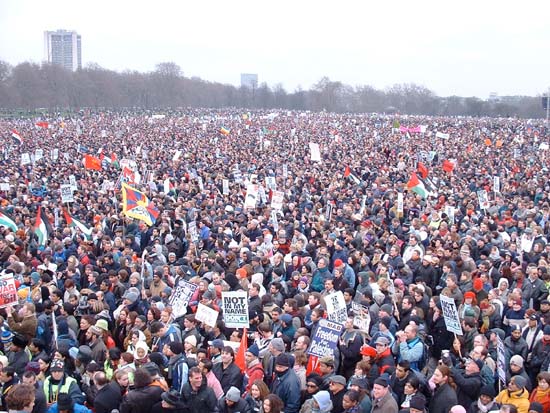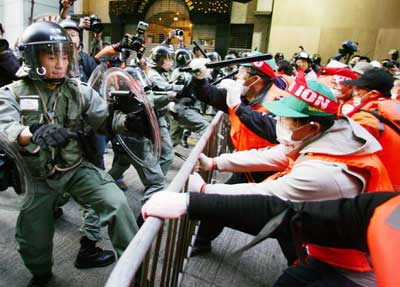Saturday, May 31, 2008
The just-about-Gramscian theory of successful rioting posted by Adam Marks

We live in a time when struggle is a war of position. Politics, economics and ideology in Britain have been relatively stable for the past 20-25 years. Just as where peace between states is only the time it takes to prepare for war, peace between classes only means the ruling class and the classes below it are fighting for best position from which to launch the next onslaught. The only difference is that capitalists are generally organised and conscious, whereas the other classes are generally not.
The job for any revolutionary organisation (any) is to shore up its position and its organisation before the advent of a revolution. This means using every available means to renew contact with its base.
In practice this means taking best advantage of each and every crack in mainstream consensus. In Britain we can only refer to the anti-war movement as the last significant, national break. The disintegration of the pro-war argument took place over the summer and autumn of 2002. A growing number of people became convinced a war with Iraq was being organised and that it should be stopped, the war drive was one egregious lie too far.
The fact that a (relatively) small number of people, in particular revolutionaries, took the time beforehand to fight for an organisation that could receive and give expression to this movement paid off. By the time the movement came to a head, provincial market towns and industrial cities in Britain could hold regular activist meetings of 50-100 people. Stop the War groups could call upon a wealth of human talent. One plausible estimate I remember from the height of the movement was 50,000 activists in 500 branches or affiliated organisations.

This number of people could successfully win the political battle amongst the wider population, against the mainstream parties and media (even pulling some in their wake, such as the Liberal Democrats or the Daily Mirror). They could call large local demonstrations, pull off successful direct action and, of course, build huge national marches as part of international demonstrations.
Though by no means permanent, the lasting benefits of the anti-war movement have been a generalised anti-imperialist consciousness, a suspicion of secretive, undemocratic government and a check on the racist backlash against Muslims. These gains must be defended.
When open class struggle with the serious prospect of social revolution breaks out, war of manoeuvre, the better organised a class is the more likely it will hold positions gained. A short example, one of the key reasons behind the bloody stalemate in Iraq is, all other things being equal, the Iraqi resistance simply isn’t united enough to provide a state alternative at the moment (which is not to deny the heroism or necessity of the resistance).
I want to illustrate the point about organization as a product of war of position in a slightly unusual way: through street encounters. The first physical line of defence for the ruling class is the police force. The moment when cohesion of the ruling class has weakened enough so the unity of the lower classes can come together, enough to set a significant portion of them into action, is when the police appear.
The bad news is the police will never be won to our side, not as a rule. They are handsomely paid for their jobs, very tightly controlled and ideologically marshalled by their superiors. Most importantly they are hardened by regular contact with the public. The moment the armed forces are set on the public is an intense psychic test for a revolution, as the members, especially the lower members, of the armed forces are simply not trained for the situation.

The good news is, given preparation (the opportunity for which, of course, is normally denied), the average citizen can match a police officer blow for blow. A police officer has access to hand arms, in particular clubs, but the ordinary citizen can get and/or easily improvise these. The same is true of body armour and self-defence. The police have roadblocks, the people barricades. The police can use sturdy, powerful vehicles, so can the public. The police can use tools such as water cannons to disperse a crowd but a resourceful crowd can use similar devices to reverse effect. The police can use small firearms. Even in Britain it is not impossible for a member of the public to get hold of some. Any weapons won from the police in battle can immediately be used against them.

The point is the police rely upon superior organisation and centralised control, not firepower. There are relatively few police officers in any country, never enough to deal with a general movement of people. This is one of the reasons why movements should be as numerous and broad as possible, to reduce the harm to life and limb to a minimum. When 2 million people are intent on using Hyde Park for a demonstration there is nothing the state can do to stop them (without seriously upping the ante).
When 125,000 miners go on strike (in albeit heightened circumstances), and are hung out to dry by union bureaucracy, the state is able to shift thousands of officers to mining areas to attack pickets and lay siege to villages, concentrating its all its power on its scattered, isolated opponent.
The key is to (1) prepare and organise as best you can, necessary but easier said than done, and (2) turn the tables and strike at their weak points. The police rely on organisation and co-ordination; do your best to break it.
For example, if the police are relying on you using a rigid set of tactics sell them a dummy and do the very opposite of what they want you to. During the anti-G8 demonstrations in Germany recently there was a very successful direct action that blocked the railway line to the summit resort. The police blocked every road route toward the resort. The marchers approached a blockade as a mass before raising a set of flags and dispersing in large, pre-organised groups into fields of shoulder high corn, following the flags. The police had not planned for this and could not cope with it; their organisation had been broken.

The point is there have been several years, and a huge variety of anti-capitalist mobilizations, from strikes to demos to blockades and so on. There is a shared anti-capitalist experience in Europe. On that particular day it became the organization of direct action. Current mass movements should be organized, their experience generalized so their achievements are not lost so when the big break happens we are not starting from zero again.
Labels: gramsci, police, war of position










